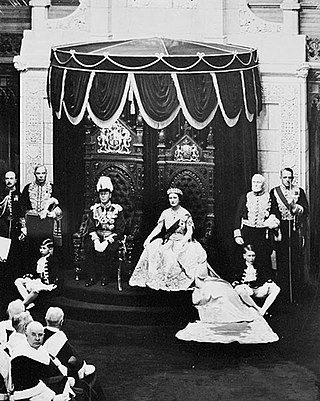The Pink Panther is an American media franchise primarily focusing on a series of comedy-mystery films featuring an inept French police detective, Inspector Jacques Clouseau. The franchise began with the release of the film The Pink Panther in 1963. The role of Clouseau was originated by and is most closely associated with Peter Sellers. Most of the films were written and directed by Blake Edwards, with theme music composed by Henry Mancini. Elements and characters inspired by the films were adapted into other media, including books, comic books, video games and animated series.

Royal assent is the method by which a monarch formally approves an act of the legislature, either directly or through an official acting on the monarch's behalf. In some jurisdictions, royal assent is equivalent to promulgation, while in others that is a separate step. Under a modern constitutional monarchy, royal assent is considered little more than a formality. Even in nations such as the United Kingdom, Norway, the Netherlands, Liechtenstein and Monaco which still, in theory, permit their monarch to withhold assent to laws, the monarch almost never does so, except in a dire political emergency or on advice of government. While the power to veto by withholding royal assent was once exercised often by European monarchs, such an occurrence has been very rare since the eighteenth century.

The Uniform Commercial Code (UCC), first published in 1952, is one of a number of uniform acts that have been established as law with the goal of harmonizing the laws of sales and other commercial transactions across the United States through UCC adoption by all 50 states, the District of Columbia, and the Territories of the United States.
Caveat emptor is Latin for "Let the buyer beware". It has become a proverb in English. Generally, caveat emptor is the contract law principle that controls the sale of real property after the date of closing, but may also apply to sales of other goods. The phrase caveat emptor and its use as a disclaimer of warranties arises from the fact that buyers typically have less information than the seller about the good or service they are purchasing. This quality of the situation is known as 'information asymmetry'. Defects in the good or service may be hidden from the buyer, and only known to the seller.
Bait-and-switch is a form of fraud used in retail sales but also employed in other contexts. First, the merchant "baits" the customer by advertising a product or service at a low price; then when the customer goes to purchase the item, they discover that it is unavailable, and the merchant pressures them instead to purchase a similar but more expensive product ("switching").

The Council of State is the privy council of the Kingdom of Denmark. The body of advisors to the Danish monarch, the council is a formal institution, with largely ceremonial functions. Chaired by the monarch, the council comprises all cabinet ministers and the crown prince or princess when coming of age. When unavailable, the monarch is represented by the regent or Lord Protector.

A letter of credit (LC), also known as a documentary credit or bankers commercial credit, or letter of undertaking (LoU), is a payment mechanism used in international trade to provide an economic guarantee from a creditworthy bank to an exporter of goods. Letters of credit are used extensively in the financing of international trade, when the reliability of contracting parties cannot be readily and easily determined. Its economic effect is to introduce a bank as an underwriter that assumes the counterparty risk of the buyer paying the seller for goods.

Meeting of the minds is a phrase in contract law used to describe the intentions of the parties forming the contract. In particular, it refers to the situation where there is a common understanding in the formation of the contract. Formation of a contract is initiated with a proposal or offer. This condition or element is considered a requirement to the formation of a contract in some jurisdictions.
A real estate contract is a contract between parties for the purchase and sale, exchange, or other conveyance of real estate. The sale of land is governed by the laws and practices of the jurisdiction in which the land is located. Real estate called leasehold estate is actually a rental of real property such as an apartment, and leases cover such rentals since they typically do not result in recordable deeds. Freehold conveyances of real estate are covered by real estate contracts, including conveying fee simple title, life estates, remainder estates, and freehold easements. Real estate contracts are typically bilateral contracts and should have the legal requirements specified by contract law in general and should also be in writing to be enforceable.

A standard form contract is a contract between two parties, where the terms and conditions of the contract are set by one of the parties, and the other party has little or no ability to negotiate more favorable terms and is thus placed in a "take it or leave it" position.

Trail of the Pink Panther is a 1982 comedy film directed by Blake Edwards and starring Peter Sellers. It is the seventh film in The Pink Panther series, the first film in the series following Sellers's death and also the last in which he appeared as Inspector Clouseau. Sellers died 18 months before production began; his performance consists entirely of his deleted scenes and outtakes from previous films. Although the Sellers estate sued United Artists and the unauthorized use of the footage was ruled illegal, the film was allowed to be released anyways. The newly shot material in the film stars Joanna Lumley as journalist Marie Jouvet searching for the missing Clouseau – and running afoul of the inspector's enemies who do not wish to see him return.

The Parliament of Western Australia is the bicameral legislature of the Australian state of Western Australia, which constitutes the legislative branch of the state's political system. The parliament consists of the King, the Legislative Council and the Legislative Assembly. The two Houses of Parliament sit in Parliament House in the state capital, Perth.

Unconscionability is a doctrine in contract law that describes terms that are so extremely unjust, or overwhelmingly one-sided in favor of the party who has the superior bargaining power, that they are contrary to good conscience. Typically, an unconscionable contract is held to be unenforceable because no reasonable or informed person would otherwise agree to it. The perpetrator of the conduct is not allowed to benefit, because the consideration offered is lacking, or is so obviously inadequate, that to enforce the contract would be unfair to the party seeking to escape the contract.

Offer and acceptance are generally recognized as essential requirements for the formation of a contract. Analysis of their operation is a traditional approach in contract law. This classical approach to contract formation has been modified by developments in the law of estoppel, misleading conduct, misrepresentation, unjust enrichment, and power of acceptance.

Butler Machine Tool Co Ltd v Ex-Cell-O Corp (England) Ltd [1977] EWCA Civ 9 is a leading English contract law case. It concerns the problem found among some large businesses, with each side attempting to get their preferred standard form agreements to be the basis for a contract.

Canadian contract law is composed of two parallel systems: a common law framework outside Québec and a civil law framework within Québec. Outside Québec, Canadian contract law is derived from English contract law, though it has developed distinctly since Canadian Confederation in 1867. While Québecois contract law was originally derived from that which existed in France at the time of Québec's annexation into the British Empire, it was overhauled and codified first in the Civil Code of Lower Canada and later in the current Civil Code of Quebec, which codifies most elements of contract law as part of its provisions on the broader law of obligations. Individual common law provinces have codified certain contractual rules in a Sale of Goods Act, resembling equivalent statutes elsewhere in the Commonwealth. As most aspects of contract law in Canada are the subject of provincial jurisdiction under the Canadian Constitution, contract law may differ even between the country's common law provinces and territories. Conversely; as the law regarding bills of exchange and promissory notes, trade and commerce, maritime law, and banking among other related areas is governed by federal law under Section 91 of the Constitution Act, 1867; aspects of contract law pertaining to these topics are harmonised between Québec and the common law provinces.
Browsewrap is a term used in Internet law to refer to a contract or license agreement covering access to or use of materials on a web site or downloadable product. In a browse-wrap agreement, the terms and conditions of use for a website or other downloadable product are posted on the website, typically as a hyperlink at the bottom of the screen. Unlike a clickwrap agreement, where the user must manifest assent to the terms and conditions by clicking on an "I agree" box, a browse-wrap agreement does not require this type of express manifestation of assent. Rather, a web-site user purportedly gives their consent simply by using the product — such as by entering the website or downloading software.

A contract is an agreement that specifies certain legally enforceable rights and obligations pertaining to two or more parties. A contract typically involves consent to transfer of goods, services, money, or promise to transfer any of those at a future date. The activities and intentions of the parties entering into a contract may be referred to as contracting. In the event of a breach of contract, the injured party may seek judicial remedies such as damages or equitable remedies such as specific performance or rescission. A binding agreement between actors in international law is known as a treaty.

Contract law regulates the obligations established by agreement, whether express or implied, between private parties in the United States. The law of contracts varies from state to state; there is nationwide federal contract law in certain areas, such as contracts entered into pursuant to Federal Reclamation Law.

Ellefson v. Megadeth, Inc. 2005 WL 82022 was a contracts case tried in the United States District Court for the Southern District of New York in 2005, in which the court determine to enforce a settlement agreement page signed and sent by fax, as an acceptance of a contract or as a counter offer.








